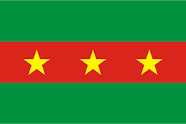Language/Ewe/Grammar/Pronouns
Hi Ewe learners! 😊
In this lesson, we will be learning about pronouns in Ewe grammar. Pronouns are words used in place of nouns to avoid repetition. In Ewe grammar, there are different types of pronouns like subject pronouns, object pronouns, and possessive pronouns. The use of pronouns can make our speech or writing more concise and clear.
Finish this lesson and explore these related pages: How to Use "Have", Geography, Adjectives & How to Use Be.
Subject Pronouns[edit | edit source]
Subject pronouns are pronouns that serve as the subject of the sentence. They are used to refer to the person or thing that performs the action in a sentence. In Ewe grammar, subject pronouns do not change. Below is a table of subject pronouns in Ewe:
| Ewe | Pronunciation | English |
|---|---|---|
| Mí | mee | I |
| Wo | woh | You (singular) |
| Yé | yeh | He |
| Wó | woh | She |
| Míaƒeƒe | meeah-feh-feh | We (inclusive) |
| Míaƒoƒo | meeah-oh-oh | We (exclusive) |
| Dɔ | doh | You (plural) |
| Wòaƒoƒo | woh-ah-oh-oh | They (male) |
| Wòaƒeƒe | woh-ah-feh-feh | They (female) |
Example Dialogue:
- Person 1: Wo ŋu nú? (How are you?)
- Person 2: Mí tsuwoe eƒe. (I am fine.)
In this dialogue, Person 1 uses the subject pronoun "Wo" to refer to themselves and Person 2 uses the subject pronoun "Mí" to refer to themselves.
Object Pronouns[edit | edit source]
Object pronouns are pronouns that serve as the object of the sentence. They are used to refer to the person or thing that receives the action in a sentence. In Ewe grammar, object pronouns change depending on their position in the sentence. Below is a table of object pronouns in Ewe:
| Ewe | Pronunciation | English |
|---|---|---|
| Míme | mee-meh | Me |
| Woƒe | woh-feh | You (singular) |
| Yéme | yeh-meh | Him |
| Wóme | woh-meh | Her |
| Míaƒeƒe | meeah-feh-feh | Us (inclusive) |
| Míaƒoƒo | meeah-oh-oh | Us (exclusive) |
| Dóƒe | doh-feh | You (plural) |
| Wòaƒoƒoƒe | woh-ah-oh-oh-feh | Them (male) |
| Wòaƒeƒeƒe | woh-ah-feh-feh-feh | Them (female) |
Example Dialogue:
- Person 1: Míme núwoe? (Do you see me?)
- Person 2: Wo ƒle. (Yes, I see you.)
In this dialogue, Person 1 uses the object pronoun "Míme" to refer to themselves and Person 2 uses the object pronoun "Woƒe" to refer to Person 1.
Possessive Pronouns[edit | edit source]
Possessive pronouns are pronouns used to show possession or ownership. They are used to avoid repetition of the noun they replace. In Ewe grammar, possessive pronouns also change depending on the possessor's gender. Below is a table of possessive pronouns in Ewe:
| Ewe | Pronunciation | English |
|---|---|---|
| Míí | mee-ee | Mine |
| Wóó | woh-oh | Yours (singular) |
| Yéé | yeh-eh | His |
| Wóó | woh-oh | Hers |
| Míanuƒoƒo | meeah-noo-oh-oh | Ours (exclusive) |
| Míanúƒeƒe | meeah-noo-feh-feh | Ours (inclusive) |
| Dóó | doh-oh | Yours (plural) |
| Wòaƒoƒónuƒoƒo | woh-ah-oh-noo-oh-oh | Theirs (male) |
| Wòaƒeƒónúƒeƒe | woh-ah-feh-noo-feh-feh | Theirs (female) |
Example Dialogue:
- Person 1: Wo na nu? (Is this yours?)
- Person 2: Yéé na minyá. (It is his/her/its.)
In this dialogue, Person 1 uses the possessive pronoun "Wóó" to refer to Person 2, and Person 2 uses the possessive pronoun "Yéé" to show possession.
Reflexive Pronouns[edit | edit source]
Reflexive pronouns are pronouns that are used when the subject and object of the sentence are the same. In Ewe grammar, reflexive pronouns take the form of an object pronoun + "le". Below is a table of reflexive pronouns in Ewe:
| Ewe | Pronunciation | English |
|---|---|---|
| Mímele | mee-meh-leh | Myself |
| Woƒele | woh-feh-leh | Yourself (singular) |
| Yémele | yeh-meh-leh | Himself/Herself/Itself |
| Ƒle Ƒle Gbɔe/ƲlƲ | feh-feh gboh-eh/ul-ul | Ourselves (exclusive) |
| Ƒle Ƒle Míaƒeƒe | feh-feh meeah-feh-feh | Ourselves (inclusive) |
| Dóƒele | doh-feh-leh | Yourselves (plural) |
| Wòaƒoƒóle | woh-ah-oh-oh-leh | Themselves (male) |
| Wòaƒeƒeƒele | woh-ah-feh-feh-leh | Themselves (female) |
Example Dialogue:
- Person 1: Wòaƒoƒóle tsɛwoe eye. (They saw themselves in the mirror.)
- Person 2: Ƒle Ƒle Míaƒoƒo egbɔe woƒelele. (We (exclusive) washed ourselves and you (singular) dressed yourself.)
In the first dialogue, Person 1 uses the reflexive pronoun "Wòaƒoƒóle" to refer to "themselves". In the second dialogue, Person 2 uses the reflexive pronoun "woƒelele" to refer to "yourself".
Indefinite Pronouns[edit | edit source]
Indefinite pronouns are pronouns that do not refer to any specific person or thing. They are used when we talk about general ideas, situations or quantity. In Ewe grammar, indefinite pronouns also change. Below is a table of indefinite pronouns in Ewe:
| Ewe | Pronunciation | English |
|---|---|---|
| Ƒeƒeƒe | feh-feh-feh | Anyone/Anybody |
| Kplekpleƒe | kpleh-kpleh-feh | Everybody/Everyone/All |
| Gbigblɔ | gbeeg-bloh | Each/Every |
| Hunu | hoo-noo | Another/Other |
| Kpóe | kpo-eh | Nobody/No one |
| Mineƒeƒe | meh-neh-feh-feh | Something |
| Mitedzoƒe | meh-teh-joh-feh | Anything |
| Miwɔƒeƒe | mee-woh-feh-feh | Everything/All |
| Miwɔmiwɔ | mee-woh-mee-woh | Everywhere |
Example Dialogue:
- Person 1: Ƒeƒeƒe to wu tso? (Did anyone see you?)
- Person 2: Kplekpleƒe to wugbe nyui ɖo. (Everyone saw me yesterday.)
In this dialogue, Person 1 uses the indefinite pronoun "Ƒeƒeƒe" to ask if anyone saw Person 2. Person 2 uses the indefinite pronoun "Kplekpleƒe" to refer to "everyone" who saw them yesterday.
To improve your Ewe Grammar, you can also use the Polyglot Club website. Find native speakers and ask them any questions!

